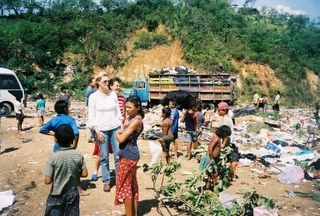
"The dump" in the hills above La Ceiba, Honduras, July 2002.

Since my last installment I've had a chance to read most of the commentary that L'Affaire Churchill has generated. I've also had a chance to take my first real look at what passes for discourse among the extreme Right. The comparison is illuminating. Although the Right is crying foul at the offensiveness of Churchill's essay, Churchill's "I offend, therefore I am" effort seems tentative and bush league compared with the likes of, say Michael Savage. Now there's a guy who knows how to be offensive!
Of course, Savage is not a member of my profession. Churchill is. I'm in no danger of getting tarred by anything Savage says, whereas some on the Right seem all too eager to make Churchill seem a representative figure within the humanities. So principle and self-interest oblige me to defend Churchill on free speech grounds. Even so, it would be nice to defend something that actually made a contribution to scholarly dialogue.
Well, if Churchill can't sustain the "little Eichmanns" metaphor, maybe I can.
Not, to be sure, in the way Churchill attempts it. Even if on September 12, 2001 (the day Churchill first published the essay), one could imagine that the "technocrats" in the World Trade Center were narrow, self-absorbed, hubristic, venal people, by 2004 (the year the essay appeared in book form) we had plenty of evidence to show otherwise. I have in front of me a copy of Portraits: 9/11/01: The Collected 'Portraits of Grief' from the New York Times (Henry Holt, 2002). To this could be added a number of online tributes and books such as On Top of the World: Cantor Fitzgerald, Howard Lutnik, & 9/11 (HarperCollins, 2003). Recent days have seen the publication of 102 Minutes: The Untold Story of the Fight to Survive Inside the Twin Towers (Henry Holt, 2005).
Still, the operative dynamic within the "Eichmann analogy" is not volitional evil, as Churchill's critics assume. It is the compartmentalization and bureaucratization that characterizes modern life. It is the way we have learned to do the job in front of us without asking, "What is the relationship of this task to the whole of life?" We take on faith the idea that if we do our jobs, the world benefits. But it is not unreasonable to suppose that our jobs influence the world in ways that are subtle, sometimes contradictory, and arguably harmful or even lethal in their ultimate results. We're not to the "little Eichmann" threshold yet--there's a lot one has to consider in order to build an analytical bridge that far--but the central dynamic of bureaucratization is too obvious to miss.
I will give one brief example. The other evening I took a digital camera to my local grocery store. I wanted to take a photo contrasting the abundance here domestically--at least here in subburbia--with the abject poverty of "the dump," shown above. I was composing my first shot when a manager came up to me, plainly agitated. It transpired that the grocery store had a policy against anyone taking photographs without permission from corporate public relations.
The manager was agitated because he feared a confrontation. After all, what could I possibly be doing with a digital camera in the store? Maybe--probably--I was a prospective litigator and therefore a threat. I just shrugged and said I didn't mind not taking the photo, but could I have the phone number of corporate PR? And what purpose was being served by the policy? The manager unbent, but only a little, and stayed in bureaucratic mode.
You might say, there's nothing exceptional about this. You'd be right. We're used to this way of organizing life. But think for a moment about how different the exchange would have been if the manager and I had been organically part of the same community. I could have told him my reasons for wanting the photo; he would have listened and would surely have had the authority, in an older store, to let me take a photo. We would, in short, have had a human exchange in which each of us would have learned more about the other. As it turned out, we had a bureaucratic exchange. The manager did not make the policy. He did not seem to understand why it was made or what purpose it served. He did not ask--did not have authority to ask--whether my project represented a threat or opportunity to the company he worked for. All he knew was that a policy existed and he was obliged to enforce it.
Just so: In the suites of the Twin Towers, there were deals to be made--deals composed of hundreds of component deals--and perched before the CRT screens lay rank upon rank of employees--"technocrats," in Churchill's phrase, whose job it was to look at their chunk of the deal, address a few equations, and move the deal along. Indispensable to the process, they nevertheless labored without knowing, without being encouraged to know or even having the information to know, whether the ultimate result of a given deal would improve the world or harm it.
Continue to next page

1 comment:
You must live in a very uptight community! In Austin, I go to a corporate grocery store up the street. For the last couple of Halloweens, I've gone there with a friend to pick up disposable cameras to take pics later, and we always take a few in the store, and often of the clerks, who are happy to pose (some of them are dressed up, too).
I'd suggest using a disposable camera, perhaps, for your picture-taking. It might be less threatening than an expensive camera
Post a Comment